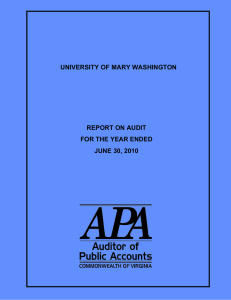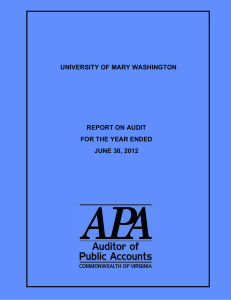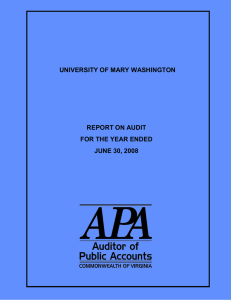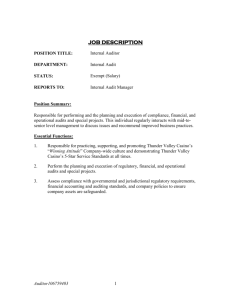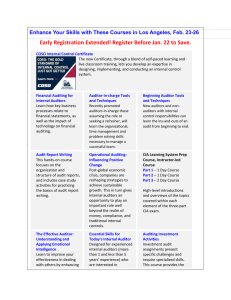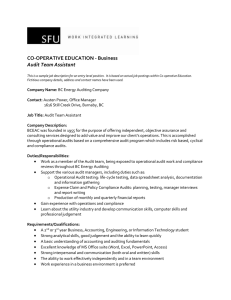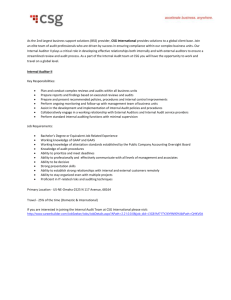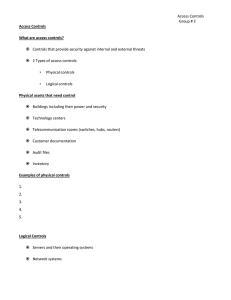UNIVERSITY OF MARY WASHINGTON REPORT ON AUDIT FOR THE YEAR ENDED
advertisement
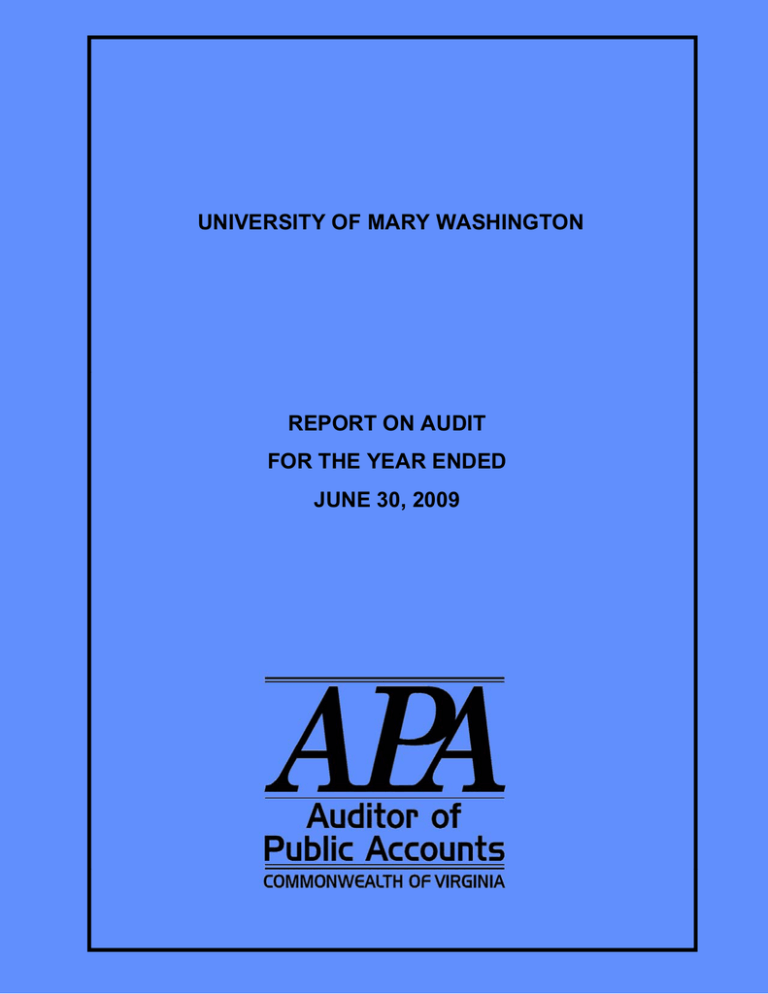
UNIVERSITY OF MARY WASHINGTON REPORT ON AUDIT FOR THE YEAR ENDED JUNE 30, 30 2009 AUDIT SUMMARY Our audit of the University of Mary Washington for the year ended June 30, 2009, found: • the financial statements are presented fairly, in all material respects; • internal control matters necessary to bring to management’s attention; • an instance of noncompliance required to be reported; and • the University has not completed adequate corrective action with respect to the audit finding reported in the prior year, “Improve Information Systems Security Program”; therefore, that finding is repeated in this year’s report. We have audited the basic financial statements of the University of Mary Washington as of June 30, 2009, and for the year then ended and issued our report thereon dated April 27, 2010. Our report, included with the University’s basic financial statements, is available at the Auditor of Public Accounts’ web site at www.apa.virginia.gov and at the University’s web site at www.umw.edu. -TABLE OF CONTENTS– Pages AUDIT SUMMARY INTERNAL CONTROL AND COMPLIANCE FINDINGS AND RECOMMENDATIONS 1-2 INDEPENDENT AUDITOR’S REPORT ON INTERNAL CONTROL OVER FINANCIAL REPORTING AND ON COMPLIANCE AND OTHER MATTERS 3-5 UNIVERSITY RESPONSE 6-7 UNIVERSITY OFFICIALS 8 INTERNAL CONTROL AND COMPLIANCE FINDINGS AND RECOMMENDATIONS Improve Information Systems Security Program The University continues to lack essential components of its Information Systems Security Program, which is necessary to provide for the protection and mitigation of risks to University data. While the University has made progress since our last audit, most of the documents comprising its Security Program remain in draft form pending management approval. The Commonwealth’s Information Security Standard (Standard) requires the University to develop and implement policies and procedures for information security and risk management that meet or exceed the requirements of the Standard. The University’s Information Security Officer (ISO) has the responsibility of developing, maintaining, and implementing these policies and procedures. Without documented information security policies and procedures, the University cannot communicate and enforce expectations of system users for security of sensitive and mission-critical data. The University also risks inconsistent application of security needs throughout the systems environment resulting in unauthorized access to data, system outages, and the inability to recover from system outages promptly, among other risks. The University should document and implement an Information Security Program that addresses each of the requirements of the Commonwealth’s Standard. The Security Program documentation must be specific and thorough to ensure its consistent application. In order to enforce these policies and procedures, University management should formally review and approve them. Throughout the implementation process, the ISO should continue to evaluate the adequacy and effectiveness of the information security program, make necessary changes, and train staff. Properly Procure Information Technology Software The former Vice President of Information Technology and Institutional Research purchased two information technology software products for the University without conducting sufficient competitive procurement. In one instance, the former Vice President only invited one vendor to conduct a demonstration of their software before finalizing the purchase by making a sole source procurement determination. In the other instance, only one vendor responded to the University’s Request for Proposals. A review by the University’s Internal Auditor determined that this gave the appearance of preferential selection of these vendors and that the sole source determination was inappropriate in this circumstance. We recommend that the University clearly define that the final responsibility for Information Technology procurement belongs to its Director of Purchasing who reports to the Associate Vice President of Business Services. Additionally, we recommend that the University follow up its recent procurement training provided by the Virginia Information Technologies Agency with annual update procurement training for Information Technology and procurement staff. We believe that implementation of these recommendations will improve the University’s procurement processes and give the appearance of fair and impartial consideration of all vendors. Review User Access to Financial Accounting System Our test of user access to the University’s Banner Financial Accounting System identified 18 individuals with access that represents inadequate separation of duties. To manage Banner access the University establishes user classes. These user classes generally relate to specific job duties and identify 1 Banner screens that a user can view or modify. Allowing individuals to have access to certain combinations of screens can compromise internal controls by eliminating a proper separation of duties. We recommend that the University perform a detailed comprehensive review of their user classes and the screens in those classes to ensure they meet the University’s business needs and eliminate access that creates inadequate separation of duties. To perform this review, management may need to create access reports should include the screen name to assist the supervisor responsible for reviewing individuals’ access for a particular business area. Reviewing the screens in the classes will make it easier for business managers to perform periodic user access reviews without having to determine if the Banner screens are inconsequential to an individual’s duties. We recognize that the University has begun the process of reviewing and evaluating access assigned to different classes. We recommend the University complete the access review and make all necessary changes to ensure the University has adequate separation of duties. 2 April 27, 2010 The Honorable Robert F. McDonnell Governor of Virginia The Honorable M. Kirkland Cox Chairman, Joint Legislative Audit and Review Commission Board of Visitors University of Mary Washington INDEPENDENT AUDITOR’S REPORT ON INTERNAL CONTROL OVER FINANCIAL REPORTING AND ON COMPLIANCE AND OTHER MATTERS We have audited the financial statements of the business-type activities and discretely presented component unit of University of Mary Washington as of and for the year ended June 30, 2009, which collectively comprise the University’s basic financial statements and have issued our report thereon dated April 27, 2010. Our report was modified to include a reference to other auditors. We conducted our audit in accordance with auditing standards generally accepted in the United States of America and the standards applicable to financial audits contained in Government Auditing Standards, issued by the Comptroller General of the United States. We did not consider internal controls over financial reporting or test compliance with certain provisions of laws, regulations, contracts, and grant agreements for the financial statements of the component unit of the University, which was audited by other auditors in accordance with auditing standards generally accepted in the United States of America, but not in accordance with Government Auditing Standards. Internal Control Over Financial Reporting In planning and performing our audit, we considered the University’s internal control over financial reporting as a basis for designing our auditing procedures for the purpose of expressing our opinion on the financial statements, but not for the purpose of expressing an opinion on the effectiveness of the University’s internal control over financial reporting. Accordingly, we do not express an opinion on the effectiveness of the University’s internal control over financial reporting. A control deficiency exists when the design or operation of a control does not allow management or employees, in the normal course of performing their assigned functions, to prevent or detect misstatements on a timely basis. A significant deficiency is a control deficiency, or combination of control deficiencies, that 3 adversely affects the entity’s ability to initiate, authorize, record, process, or report financial data reliably in accordance with generally accepted accounting principles such that there is more than a remote likelihood that a misstatement of the entity’s financial statements that is more than inconsequential will not be prevented or detected by the entity’s internal control over financial reporting. We consider the deficiencies entitled “Improve Information Systems Security Program,” “Properly Procure Information Technology Software,” and “Review User Access to Financial Accounting System”, described in the section of our report entitled “Internal Control and Compliance Findings and Recommendations” to be significant deficiencies in internal control over financial reporting. A material weakness is a significant deficiency, or combination of significant deficiencies, that results in more than a remote likelihood that a material misstatement of the financial statements will not be prevented or detected by the entity’s internal control over financial reporting. Our consideration of internal control over financial reporting was for the limited purpose described in the first paragraph of this section and would not necessarily identify all deficiencies in internal control over financial reporting that might be significant deficiencies and accordingly, would not necessarily disclose all significant deficiencies that are also considered to be material weaknesses. However, we believe that the significant deficiencies described above are not material weaknesses. Compliance and Other Matters As part of obtaining reasonable assurance about whether the University’s financial statements are free of material misstatement, we performed tests of its compliance with certain provisions of laws, regulations, contracts, and grant agreements, noncompliance with which could have a direct and material effect on the determination of financial statement amounts. However, providing an opinion on compliance with those provisions was not an objective of our audit and, accordingly, we do not express such an opinion. The results of our tests disclosed an instance of noncompliance that is required to be reported under Government Auditing Standards. The instance of noncompliance, entitled “Properly Procure Information Technology Software” is described in the section of the report entitled “Internal Control and Compliance Findings and Recommendations”. The University’s response to the findings identified in our audit is included in the section titled “University Response.” We did not audit the University’s response and, accordingly, we express no opinion on it. Status of Prior Findings The University has not completed adequate corrective action with respect to the previously reported finding “Improve Information Systems Security Program”. Accordingly, we included this finding in the section of the report entitled “Internal Control and Compliance Findings and Recommendations.” Report Distribution and Exit Conference The “Independent Auditor’s Report on Internal Control over Financial Reporting and on Compliance and Other Matters” is intended solely for the information and use of the Governor and General Assembly of Virginia, the Board of Visitors, and management, and is not intended to be and should not be used by anyone, other than these specified parties. However, this report is a matter of public record and its distribution is not limited. 4 We discussed this report with management at an exit conference held on May 4, 2010. AUDITOR OF PUBLIC ACCOUNTS JHS/clj 5 6 7 UNIVERSITY OF MARY WASHINGTON BOARD OF VISITORS As of June 30, 2009 Nanalou W. Sauder, Rector Daniel K. Steen, Vice Rector Patricia B. Revere, Secretary Randall R. Eley Princess R. Moss Elizabeth F. Foster J. William Poole Benjamin W. Hernandez Xavier R. Richardson Martha K. Leighty Russell H. Roberts Maureen Stinger ADMINISTRATIVE OFFICERS As of April 27, 2010 Richard V. Hurley, Acting President Richard R. Pearce, Vice President for Business and Finance Allyson P. Moerman, Assistant Vice President for Finance and Controller 8
